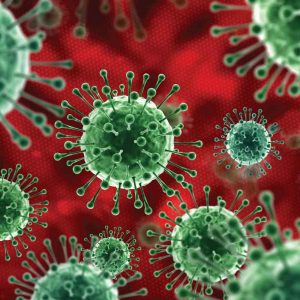Tech & Science dictionary
germophobe
or germaphobe [ jurm-uh-fohb ]
What does germophobe mean?
A germophobe, also spelled germaphobe, is a person who is afraid of germs or preoccupied with cleanliness.
Specifically, it can refer to a person who has an obsessive compulsion toward cleanliness to the point that their life is impacted by an urge to constantly clean their hands and living spaces. Germaphobes may or may not have obsessive-compulsive disorder (OCD).
Where does germophobe come from?

A germophobe literally refers to someone who is fearful (-phobe) of germs. The earliest uses of the word are rhetorical or humorous in tone, as the word is still so used today.
Germophobia appears in an 1893 edition of the journal Medical Record: “Law is intended for sinners; and germophobia does its fine work among the criminal classes—those who get sick, I mean, through willful [sic] or indifferent violation of the hygienic precepts of the physical decalogue.”
Germophobe appears in 1894 as a snarky signature to a letter to London’s historic Punch magazine: “Are these microbes season-ticket-holders? If so, what are the companies about? Germaphobe.”
Its early colorful uses aside, germophobia is commonly associated with mysophobia, an irrational fear of contamination, which American doctor William Alexander Hammond coined when studying a case of obsessive-compulsive disorder (OCD) in 1879.
Some germophobes may clinically suffer from OCD and related disorders, which manifest themselves as intense and debilitating fear of germs. Others germaphobes, however, have an excessive, though not pathological, compulsion towards neatness or revulsion to dirt and bacteria.
Outside of clinical contexts, people often label themselves germaphobes to explain certain behaviors, which include avoiding shaking hands with other people, ritually continually cleaning surfaces at home and in public, and an obsession with trying not to get sick.
A number of celebrities, including Charlize Theron and Howie Mandel, have spoken out about being germophobes and the negative effect it has had on their lives. President Donald Trump also notably called himself “very much a germophobe” in 2017, which lead to spike in interest search for the word.
Interest in germophobe also spiked in 2019, with increased hand-washing during the coronavirus outbreak (COVID-19). And no, if we may editorialize for a moment, you’re not a germophobe for washing your hands a lot during the outbreak—you’re helping slow the spread of disease!
Germophobes have also featured in popular media, such as in characters like Adrian Monk of from crime comedy Monk and Peggy, Elaine’s coworker in Season 9 of Seinfeld.
Examples of germophobe
Who uses germophobe?
While it can refer to a person with a clinical fear of germs as a result of OCD, a germophobe can casually refer to someone whose preference for tidiness and cleanliness is considered abnormal, often used by such individuals themselves.
As a germophobe I'm glad that people are stressing the importance of washing your hands, but as a germophobe I'm concerned that people are just now stressing the importance of washing your hands
— Aaron Witt (@aaronwitt24) March 12, 2020
Those diagnosed with OCD whose symptoms manifest as germophobia are sometimes offended by more flippant uses of germaphobe. Germaphobe is sometimes used, out of disrespect or ignorance of the condition, as a generic term for a person with OCD, due to popular stereotypes about OCD symptoms, e.g., compulsive hand-washing.
I'm neither a hysteric nor a germophobe, but with each passing day, taking a crowded public transportation system to my job at a major tourist destination becomes more and more… anxious. Luckily I am an EXPERT at social isolation.
— Peter Huestis (@RealSparklePony) March 12, 2020
Note
This is not meant to be a formal definition of germophobe like most terms we define on Dictionary.com, but is rather an informal word summary that hopefully touches upon the key aspects of the meaning and usage of germophobe that will help our users expand their word mastery.